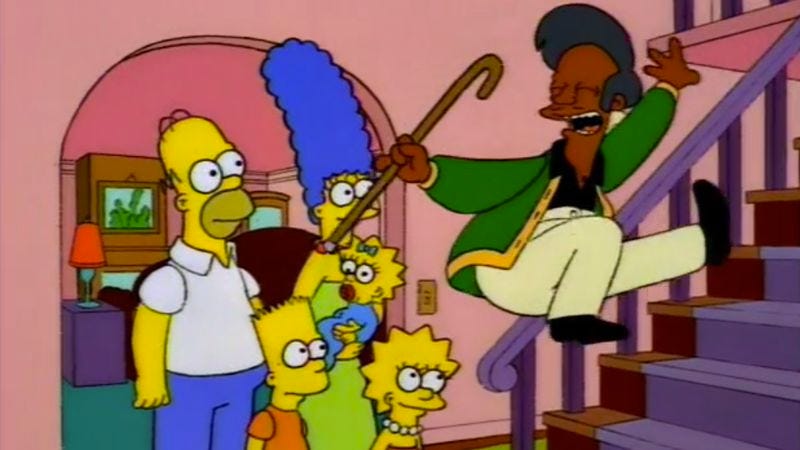

“Roseanne” got a lot of attention in the ’90s for representing middle-class America, but Homer’s fight here to keep his union’s dental plan is as cleareyed as anything that series did. While there may be laugh-out-loud funnier episodes from this era, few get at the themes that define the best of “The Simpsons” while also illustrating the genius of its writers better than “Last Exit to Springfield.” What other show could reference “Last Exit to Brooklyn,” “Yellow Submarine,” “The Godfather Part II,” “Citizen Kane” and “The Grinch Who Stole Christmas” in a way that doesn’t feel forced or, as with so many of the show’s imitators, gratuitous. The physical humor of Homer’s extended plummet down the gorge only solidified this episode as one of the series’s best.ĪLSO WATCH: “Simpsons Roasting on an Open Fire” (1.1), “Moaning Lisa” (1.6), “Two Cars in Every Garage and Three Eyes on Every Fish” (2.4), “Itchy and Scratchy and Marge” (2.9), “Lisa’s Substitute” (2.19) and also thinking that his plan to jump Springfield Gorge on his skateboard sounded pretty cool. We could all remember wanting to do something dangerous, and parents could understand Homer’s conflict between not wanting Bart to die. It worked because, in many ways, the Simpsons were more relatable - they didn’t hide their flaws.

Is it any wonder that some groups saw a back-talking child and a beer-drinking father as a threat?īut “The Simpsons” wouldn’t have worked if it were merely thumbing its nose at the Huxtables.

Simpsons classic episodes tv#
It also subverted the TV comedy conventions of its time - when this episode debuted, “Family Matters,” “Full House,” “The Cosby Show” and “Empty Nest” were Top 15 programs. Viewers above a certain age will remember when a skateboarding Bart covered every type of merchandise imaginable, and this brilliant Season 2 episode plays with that iconography. The first two seasons of “The Simpsons” established much about what people still know and love about the show. That idea that a well-meaning action can go horribly awry became a foundation of “Simpsons” humor.ĪLSO WATCH: “The Pacifier,” “Burping Contest,” “Jumping Bart,” “Making Faces,” “World War III”Įpisode to Watch: ‘Bart the Daredevil’ (2.8) We watch as Homer and Marge try to put their kids to bed, but instead of comforting the kids, they traumatize them all three children wind up shivering in Marge and Homer’s bed. However, even in “Good Night,” you can see the roots of the Simpsons’ quirky subversion of the modern American TV family. As Groening told the BBC, he submitted hand-drawn sketches to his animation team and was stunned when they just traced over what he gave them. They’re clearly personal - Groening named and modeled the characters after his own family - and remarkably crude. It all started on April 19, 1987, with “Good Night” - 47 more shorts were created over the next two years. The creator of “The Simpsons,” Matt Groening, originally planned to adapt his popular “Life in Hell” comic strip into bumpers for the show, but balked upon discovering he would have to give up the rights to his creation. Hulu also streams recent episodes.)Ĭharacters on “The Simpsons” first found their voices (and early sense of humor) in shorts that accompanied Fox’s “The Tracey Ullman Show” from 1987 to 1989. (FXX has a website with every episode of “The Simpsons” but not the original shorts a subscription to cable or FXNOW is required. We’ve also recommended the episodes that best represent each era. Almost thirty years after its premiere, “The Simpsons” still matters.īelow, we’ve broken down the history of “The Simpsons” into six distinct eras, based on the ways its humor has changed over the years. And while Homer, Marge, Bart, Lisa and Maggie have stayed the same age, what the world finds funny has changed - in no small part because of those characters’ influence. The first family of Springfield has witnessed five American presidents, the dawn of the internet age, the end of the Cold War, at least two prolonged conflicts in the Middle East, terrorist attacks, natural disasters and more. Neither “The Simpsons” nor history has stood still since the show debuted in 1989. 30, it’s a good time to reflect on how “The Simpsons” has evolved during its unparalleled run, and how each era in that evolution has reflected - or failed to reflect - the state of comedy, and of the culture, as a whole. For the past three decades, there has been one constant in America’s comedy landscape: “The Simpsons.” With that animated sitcom now approaching the start of its 30th season, on Sept.


 0 kommentar(er)
0 kommentar(er)
